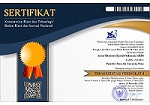Investment Decision Making for Indonesian Gen Z in the Islamic Capital Market
Abstract
Introduction: The rapid growth of Indonesia’s Islamic capital market, particularly in the Special Region of Yogyakarta (DIY), is driven by technological advancements, improved investment literacy, and psychological factors such as financial self-efficacy. As digital natives, Generation Z holds significant potential to become Sharia-compliant investors. This study examines the effects of technological advancement, investment knowledge, and financial self-efficacy on investment decisions in the Islamic capital market, with investment interest serving as a mediating variable, grounded in the Theory of Planned Behavior (TPB).
Methods: A causal-associative quantitative approach was employed, involving 100 Generation Z respondents in DIY who had prior experience in Islamic capital market transactions. Respondents were selected through purposive sampling, and data were collected via an online questionnaire. Data analysis utilized Partial Least Squares Structural Equation Modeling (PLS-SEM) to evaluate both direct and indirect relationships between variables.
Results: Findings indicate that technological advancement, investment knowledge, and financial self-efficacy each have a significant positive effect on investment decisions. Technological advancement and financial self-efficacy also significantly and positively influence investment interest, while investment knowledge does not significantly affect investment interest. Moreover, investment interest mediates the relationship between technological advancement and financial self-efficacy with investment decisions, but not between investment knowledge and investment decisions. Measurement model assessment confirmed reliability and validity, with composite reliability exceeding 0.7 and Average Variance Extracted (AVE) values above 0.5.
Conclusion: Technological advancement and financial self-efficacy are key drivers of both interest and decision-making among Generation Z investors in the Islamic capital market. In contrast, investment knowledge tends to directly influence decisions without enhancing interest. These findings highlight the importance of leveraging technology and strengthening financial confidence through practical education. Market regulators and industry players can use these insights to design targeted literacy programs and campaigns aimed at engaging young investors.
Keywords
Full Text:
PDFReferences
Abadi, M. K. R., & Bin Annuar, H. A. (2023). Financial Behaviour, Financial Self Efficacy and Intention to Invest in Cryptocurrency. Al Tijarah, 9(2), 120–135. https://doi.org/10.21111/at.v9i2.11186
Abdul Halim, Z., How, J., Verhoeven, P., & Hassan, M. K. (2020). Asymmetric information and securitization design in Islamic capital markets. Pacific Basin Finance Journal, 62. https://doi.org/10.1016/j.pacfin.2019.101189
Adiningtyas, S., & Hakim, L. (2022). Pengaruh Pengetahuan Investasi, Motivasi, dan Uang Saku terhadap Minat Mahasiswa Berinvestasi di Pasar Modal Syariah dengan Risiko Investasi sebagai Variabel Intervening. Jurnal Ilmiah Ekonomi Islam, 8(1), 474–482. https://doi.org/10.29040/JIEI.V8I1.4609
Aisa, N. N. (2022). Do Financial Literacy and Technology Affect Intention to Invest in the Capital Market in the Early Pandemic Period? Journal of Accounting and Investment, 23(1), 49–65. https://doi.org/10.18196/jai.v23i1.12517
Ajzen, I. (1991). The theory of planned behavior. Organizational Behavior and Human Decision Processes, 50(2), 179–211. https://doi.org/10.1016/0749-5978(91)90020-T
Ajzen, I. (2011). The theory of Planned Behaviour: Reactions and Reflections. Psychology and Health, 26(9), 1113–1127. https://doi.org/10.1080/08870446.2011.613995
Angela, D., Wiyanto, H., & Budiono, H. (2023). THE INFLUENCE OF FINANCIAL CONFIDENCE, FINANCIAL SOCIALIZATION, HERDING, AND MENTAL ACCOUNTING ON INVESTMENT DECISION AMONG GENERATION Z IN JAKARTA. International Journal of Application on Economics and Business, 1(4), 2033–2046. https://doi.org/10.24912/ijaeb.v1i4.2033-2046
Bertuah, E., & Oppusunggu, H. D. H. (2022). Examining The Effect of Theory of Planned Behavior on Individual Investment Intention in The Indonesia Stock Exchange, Moderated by Herding Behavior and Risk Propensity. MIX: JURNAL ILMIAH MANAJEMEN, 12(3), 399. https://doi.org/10.22441/jurnal_mix.2022.v12.i3.004
Cahya, B. T., & W., N. A. K. (2019). Pengaruh Motivasi dan Kemajuan Teknologi Terhadap Minat Investasi Saham. Al-Masharif: Jurnal Ilmu Ekonomi Dan Keislaman, 7(2), 192–207. https://doi.org/10.24952/MASHARIF.V7I2.2182
Citra Sondari, M., & Sudarsono, R. (2015). Using Theory of Planned Behavior in Predicting Intention to Invest : Case of Indonesia Article Information. International Academic Research Journal of Business and Technology, 1(2), 137–141.
Costansje, B., Kurniasari, F., & Abubakar, A. (2023). The Effects of Financial Literacy, Self-Efficacy, and Financial Stress on Risky Credit Behavior of Generation Z: Evidence from Pay Later Users. Journal of Entrepreneurship, Business and Econom-Ics, 11(1), 180–210. www.scientificia.com
Dare, S. E., van Dijk, W. W., van Dijk, E., van Dillen, L. F., Gallucci, M., & Simonse, O. (2023). How Executive Functioning and Financial Self-efficacy Predict Subjective Financial Well-Being via Positive Financial Behaviors. Journal of Family and Economic Issues, 44(2), 232–248. https://doi.org/10.1007/s10834-022-09845-0
Fadilah, U., Solihin, S., & Karsam, K. (2024). The Influence Of Financial Technology Products, Investment Knowledge, Student Investment Interest And Return On Investment Decisions. Case Study On Students In Sidoarjo Regency, East Java. Eduvest - Journal of Universal Studies, 4(5), 4322–4339. https://doi.org/10.59188/EDUVEST.V4I5.1192
Fateye, T. B., Peiser, R. B., & Ajayi, C. A. (2024). Behavioral factors influencing investment decision-making in the Nigerian real estate stock market. Scientific African, 24, e02238. https://doi.org/10.1016/J.SCIAF.2024.E02238
Firdaus, R. A., Keuangan, P., & Stan, N. (2022). PENGARUH PENGETAHUAN INVESTASI DAN MOTIVASI INVESTASI TERHADAP MINAT INVESTASI MAHASISWA POLITEKNIK KEUANGAN NEGARA STAN DI PASAR MODAL. JURNAL ACITYA ARDANA, 2(1), 16–28. https://doi.org/10.31092/JAA.V2I1.1434
Gamst-Klaussen, T., Steel, P., & Svartdal, F. (2019). Procrastination and personal finances: Exploring the roles of planning and financial self-efficacy. Frontiers in Psychology, 10(APR). https://doi.org/10.3389/fpsyg.2019.00775
Grimes, P. W., Lopus, J. S., & Amidjono, D. S. (2022). Financial life-skills training and labor market outcomes in Indonesia. International Review of Economics Education, 41, 100255. https://doi.org/10.1016/J.IREE.2022.100255
Haikal, O. F., Yudiantoro, D., Hidayati, A. N., Ekonomi, F., Islam, D. B., & Tulungagung, A. R. (2022). PENGETAHUAN, PENDAPATAN, DAN KEMAJUAN TEKONOLOGI TERHADAP MINAT INVESTASI MASYARAKAT DI PASAR MODAL (STUDI KASUS MASYARAKAT KABUPATEN BLITAR). Jurnal Cakrawala Ilmiah, 2(3), 943–952. https://doi.org/10.53625/JCIJURNALCAKRAWALAILMIAH.V2I3.4031
Handini, S. (2024). The Impact of Financial Literacy, Investment Knowledge, and Investment Motivation on Investment Decisions. West Science Journal Economic and Entrepreneurship, 2(02), 194–210.
Hariyani, D. S., Ayuningdiah, M. R., & Saputra, A. (2023). The Influence of Financial Technology, Financial Literacy and Financial Efficacy on Student’s Interest in Investing. Business Management Analysis Journal (BMAJ), 6(1), 22–37. https://doi.org/10.24176/BMAJ.V6I1.8572
Hasan, Z., Jayanti, E. D., Azlina, N., Lestari, R., & Muslim, M. (2022). Prospect of Islamic Electronic Money in Indonesia: Case Study on the LinkAja Application. JESI (Jurnal Ekonomi Syariah Indonesia), 12(1), 1–13. https://doi.org/10.21927/jesi.2022.12(1).1-13
Hu, J., Quan, L., Wu, Y., Zhu, J., Deng, M., Tang, S., & Zhang, W. (2021). Financial Self-Efficacy and General Life Satisfaction: The Sequential Mediating Role of High Standards Tendency and Investment Satisfaction. Frontiers in Psychology, 12. https://doi.org/10.3389/fpsyg.2021.545508
Hutasoit, A. H., & Ginting, T. L. (2020). Effect of Information Technology, Investment Knowledge and Financial Literacy Millennial Generation Of Interest Invest in Capital Market. Jurnal Mantik, 4(1), 1700–1707.
Khan, M. S., Azad, I., Moosa, S., & Javed, M. Y. (2024). Do we really need financial literacy to access the behavioral dynamics of generation Z? A case of Oman. Heliyon, 10(13), e32739. https://doi.org/10.1016/J.HELIYON.2024.E32739
Khan, S. U., Shah, S. I., & Shafiq, M. (2023). Effect of Financial Literacy and Financial Self-Efficacy on Individuals’ Investment Intention: The Mediating Role of Risk-Taking Behavior. Global Economics Review, VIII(III), 42–55. https://doi.org/10.31703/ger.2023(viii-iii).04
Kina, A., Samsuri, A., & Erdkhadifa, R. (2022). An-Nisbah: Jurnal Ekonomi Syariah THE EFFECT OF INVESTMENT KNOWLEDGE ON STUDENT’S INTEREST IN INVESTING SHARIA SHARE.
Komijani, A., & Taghizadeh-Hesary, F. (2018). ADBI Working Paper Series AN OVERVIEW OF ISLAMIC BANKING AND FINANCE IN ASIA Asian Development Bank Institute. https://www.adb.org/publications/overview-islamic-banking-and-finance-asia
Kusmawati. (2011). Pengaruh Motivasi, Persepsi Risiko terhadap Ninat Berinvestasi di Pasar Modal dengan Pemahaman Investasi dan Usia Sebagai Variabel Moderat. Jurnal Ekonomi Dan Informasi Akuntansi (Jenius), 1(2), 103–117.
Lee, J. M., Park, N., & Heo, W. (2019). Importance of subjective financial knowledge and perceived credit score in payday loan use. International Journal of Financial Studies, 7(3). https://doi.org/10.3390/ijfs7030053
Mahriza, T., & Amar B, S. (2019). PENGARUH INVESTASI DALAM NEGERI, INVESTASI ASING, TENAGA KERJA DAN INFRASTRUKTUR TERHADAP PEREKONOMIAN DI PROVINSI SUMATERA BARAT. Jurnal Kajian Ekonomi Dan Pembangunan, 1(3), 691. https://doi.org/10.24036/JKEP.V1I3.7697
Mujiani, S. (2023). The Influence Self-Efficacy on Student’s Investment Interest with Investment Knowledge as a Moderating Variable. Edunomika, 08(01), 2023.
Mulyani, N. P., & Wirawati, N. G. P. (2024). Impact of Investment Knowledge, Financial Literacy, and Minimum Capital Requirements on Student Stock Investment Interest. E-Jurnal Akuntansi, 34(7), 1746. https://doi.org/10.24843/EJA.2024.v34.i07.p09
Musa, F. B., & Sundari, S. (2024). THE INFLUENCE OF INVESTMENT KNOWLEDGE, TECHNOLOGICAL PROGRESS, AND CAMPUS SUPPORT CAPACITY ON INVESTMENT INTEREST. International Journal of Multidisciplinary Research and Literature IJOMRAL, 3(2), 150–159. https://doi.org/10.53067/ijomral.v3i2
Musa, H., Ahmad, N. H. B., & Nor, A. M. (2024). Extending the Theory of Planned Behavior in financial inclusion participation model–evidence from an emerging economy. Cogent Economics and Finance, 12(1). https://doi.org/10.1080/23322039.2024.2306536
Nabila, N., & Kusnadi, I. (2020). PENGARUH PEMAHAMAN, PENDAPATAN DAN RELIGIUSITAS TERHADAP MINAT UNTUK BERINVESTASI DI PASAR MODAL SYARIAH (Studi Pada Mahasiswa Fakultas Ekonomi dan Bisnis Islam IAIS Sambas). Cross-Border, 3(1), 124–140. https://journal.iaisambas.ac.id/index.php/Cross-Border/article/view/648
Nurfadilah, N., Wahyuni, I., & Subaida, I. (2022). PENGARUH PENGETAHUAN INVESTASI DAN KEMAJUAN TEKNOLOGI TERHADAP KEPUTUSAN INVESTASI DENGAN MINAT INVESTASI SEBAGAI VARIABEL INTERVENING (STUDI MAHASISWA PRODI MANAJEMEN UNIVERSITAS ABDURACHMAN SALEH SITUBONDO). Jurnal Mahasiswa Entrepreneurship (JME), 1(8), 1630–1644. https://doi.org/10.36841/JME.V1I8.2209
Oanh, T. T. K. (2024). Digital financial inclusion in the context of financial development: Environmental destruction or the driving force for technological advancement. Borsa Istanbul Review, 24(2), 292–303. https://doi.org/10.1016/j.bir.2024.01.003
Octarina, E., Hartoyo, H., & Beik, I. S. (2019). Customer Purchase Intention on Sharia Mutual Fund Products: a TPB Approach. Journal of Consumer Sciences, 4(1), 37. https://doi.org/10.29244/jcs.4.1.37-47
Paulus Risang. (2024). DIY Raih Penghargaan Provinsi Investor Syariah dari BEI.
Prabowo, H., Mustafida, D., & Kurniawan, B. (2023). The Effect of Investment Knowledge on Investment Decisions of FEB Students at Investment Gallery FEB Upgris With Financial Literacy and Financial Behavior as Intervening Variables. Jurnal Aplikasi Bisnis Dan Manajemen. https://doi.org/10.17358/jabm.9.1.59
Purbowisanti, R. (2021). MODEL PERILAKU INVESTOR SAHAM SYARIAH DI PASAR MODAL: PENGEMBANGAN THEORY OF PLANNED BEHAVIOR (TPB) DAN INSTITUTIONAL THEORY.
Putra Utama, D., & Sumarna, A. D. (2024). Financial Technology Literacy Impact on Gen-Z in Indonesia. Dinasti International Journal of Economics, Finance & Accounting (DIJEFA), 4. https://doi.org/10.38035/dijefa.v4i6
Putri, I. H. A., & Santoso, A. (2024). Pengaruh Pengetahuan Investasi, Persepsi Risiko Dan Kemajuan Teknologi Terhadap Keputusan Investasi. Ekono Insentif, 18(1), 34–46. https://doi.org/10.36787/JEI.V18I1.1343
Ramadhani, A. P., Septyasari, I. A., Hasannah, F. N., & Kustiawati, D. (2022). Investasi ditinjau dari Perspektif Ekonomi dan Ekonomi Islam. Jurnal Indonesia Sosial Sains, 3(12), 1579–1589. https://doi.org/10.59141/JISS.V3I12.746
Ravi Mishra, P., & Kumar Associate Professor, S. (2025). The Impact of Technological Advancements on Investor Decision-Making and Stock Market Efficiency: A Comprehensive Analysis. In Journal of Informatics Education and Research (Vol. 5). http://jier.org
Rina Dwiarti, Shadrina Hazmi, Eno Casmi, Tri Harsini Wahyuningsih, & Wahyu Indah Mursalini. (2024). Analysis of Financial Literacy and Financial Behavior Toward Investment Decisions on Millennial: Technological Advancement as A Moderating Variable. International Journal of Scientific Research and Management (IJSRM), 12(01), 5812–5820. https://doi.org/10.18535/ijsrm/v12i01.em09
Risang, P. (2024). DIY Raih Penghargaan Provinsi Investor Syariah dari BEI | IDN Times Jogja. https://jogja.idntimes.com/news/jogja/diy-raih-penghargaan-provinsi-investor-syariah-dari-bei-00-yplq6-n003tk
Riswana, M. A., & Yasa, G. W. (2024). influence of investment knowledge, minimum capital, influencers, technological progress on students interest in investing in the capital market. International Journal of Business, Economics & Management, 7(1), 18–26. https://doi.org/10.21744/ijbem.v7n1.2249
Sahatatua, R., Astawa, I. K., Pakpahan, D. A., Suherman, A. M., Setiady, T., Tinambunan, W. D., Santoso, I. B., Noor, A., Pakpahan, E. J., Elyzabeth, E. F., & Ansari, T. S. (2024). The Strategic Role of Capital Markets: Impact and Function on the Indonesian and Israeli Economies. Jurnal Hukum Dan Adminstrasi Publik, 2(2), 103–119. https://ejournal.literaaksara.com/index.php/JHAP/article/view/140
Salisa, N. R. (2021). Faktor yang Mempengaruhi Minat Investasi di Pasar Modal: Pendekatan Theory of Planned Behaviour (TPB). Jurnal Akuntansi Indonesia, 9(2), 182–194. https://doi.org/10.30659/JAI.9.2.182-194
Samudra Mahardhika, A., Zakiyah, T., & Tinggi Ilmu Ekonomi Putra Bangsa, S. (2020). Millennials’ Intention in Stock Investment: Extended Theory of Planned Behavior. JURNAL Riset Akuntansi Dan Keuangan Indonesia, 5(1). http://journals.ums.ac.id/index.php/reaksi/index
Schoneveld, G. C. (2020). Sustainable business models for inclusive growth: Towards a conceptual foundation of inclusive business. Journal of Cleaner Production, 277, 124062. https://doi.org/10.1016/J.JCLEPRO.2020.124062
Shi, G., Li, Q., Wei, Y., Ali, M., & Lv, X. (2024). Does digital technology advancement promote natural resource utilization efficiency? Resources Policy, 94. https://doi.org/10.1016/j.resourpol.2024.105088
Singh, S. K., & Ranjan Shiv. (2024). “Impact of Technology on Stock Market.” Quest Journals Journal of Research in Business and Management, 12, 2347–3002. www.questjournals.org
Sobaih, A. E. E., & Elshaer, I. A. (2023). Risk-Taking, Financial Knowledge, and Risky Investment Intention: Expanding Theory of Planned Behavior Using a Moderating-Mediating Model. Mathematics, 11(2). https://doi.org/10.3390/math11020453
Sukmadilaga, C. , Puspitasari, E. , Yunita, D. , Nugroho, L. , & Ghani, E. K. (2021). Priority Factor Analysis on Cash Waqf Linked Sukuk (CWLS) Utilization in Indonesian Shariah Capital Market. Academy of Accounting and Financial Studies Journal, 25(5), 1–14.
Sumaiya, A., Meliala, M. S., & Setiawan, T. A. (2022). THE INFLUENCE OF INVESTMENT KNOWLEDGE, INVESTMENT MOTIVATION AND FINANCIAL LITERATURE ON INVESTMENT INTEREST (CASE STUDY IN INDONESIA STUDENTS WHO HAVE INVESTED). Indikator: Jurnal Ilmiah Manajemen Dan Bisnis, 6(2), 112. https://doi.org/10.22441/indikator.v6i2.14153
Sunarko, C., & Sutrisno, S. (2025). The effect of financial literacy, financial self-efficacy, financial technology literacy, and risk perception on stock investment decisions: Millennials preferences. Asian Management and Business Review, 19–34. https://doi.org/10.20885/AMBR.vol5.iss1.art2
Susanto, K. P., Mandagie, W. C., Endri, E., & Wiwaha, A. (2025). Financial literacy, technological progress, financial attitudes and investment decisions of Gen Z Indonesian investors. Investment Management and Financial Innovations, 22(1), 25–34. https://doi.org/10.21511/imfi.22(1).2025.03
Tang, N. (2021). Cognitive abilities, self-efficacy, and financial behavior. Journal of Economic Psychology, 87. https://doi.org/10.1016/J.JOEP.2021.102447
Toto, T., & Kartika, R. (2023). FAKTOR YANG MEMPENGARUHI MINAT GEN Z DALAM BERINVESTASI DI PASAR MODAL. Creative Research Management Journal, 6(1), 1. https://doi.org/10.32663/CRMJ.V6I1.3588
Usman, B., Rianto, H., & Aujirapongpan, S. (2025). Digital payment adoption: A revisit on the theory of planned behavior among the young generation. International Journal of Information Management Data Insights, 5(1). https://doi.org/10.1016/j.jjimei.2025.100319
Vangala, S., Dissertation, B., & Cazenave, M. B. (n.d.). IMPACT OF TECHNOLOGICAL ADVANCEMENTS ON INVESTMENT BEHAVIOR ACROSS AGE DEMOGRAPHICS IN THE DIGITAL ERA. https://www.researchgate.net/publication/382877778
Yamani, A. Z. N., & Munir, M. (2023). The Effect of Financial Self-Efficacy on Student Investment Interest Mediated by Financial Literacy. Almana : Jurnal Manajemen Dan Bisnis, 7(2), 347–358. https://doi.org/10.36555/almana.v7i2.2174
DOI: http://dx.doi.org/10.21927/jesi.2025.15(1).16-37

This work is licensed under a Creative Commons Attribution-ShareAlike 4.0 International License.












